In-Depth Analysis: Remuneration and Performance Management Essay
VerifiedAdded on 2023/06/07
|7
|1398
|470
Essay
AI Summary
This essay provides a comprehensive analysis of remuneration and performance management, comparing and contrasting different approaches highlighted in two articles. It explores the similarities and dissimilarities in the authors' claims, focusing on the importance of motivation and human resource integration in enhancing organizational efficiency. The essay delves into various remuneration and performance management approaches, such as the balanced scorecard and 360-degree feedback systems, while also considering motivational theories like Maslow’s Hierarchy of Needs and Herzberg’s two-factor theory. The merits and demerits of both remuneration and performance management are critically reviewed, emphasizing the need for fair and effective implementation to improve employee morale and organizational productivity. The conclusion underscores the importance of integrating remuneration and performance appraisal processes to achieve organizational success.
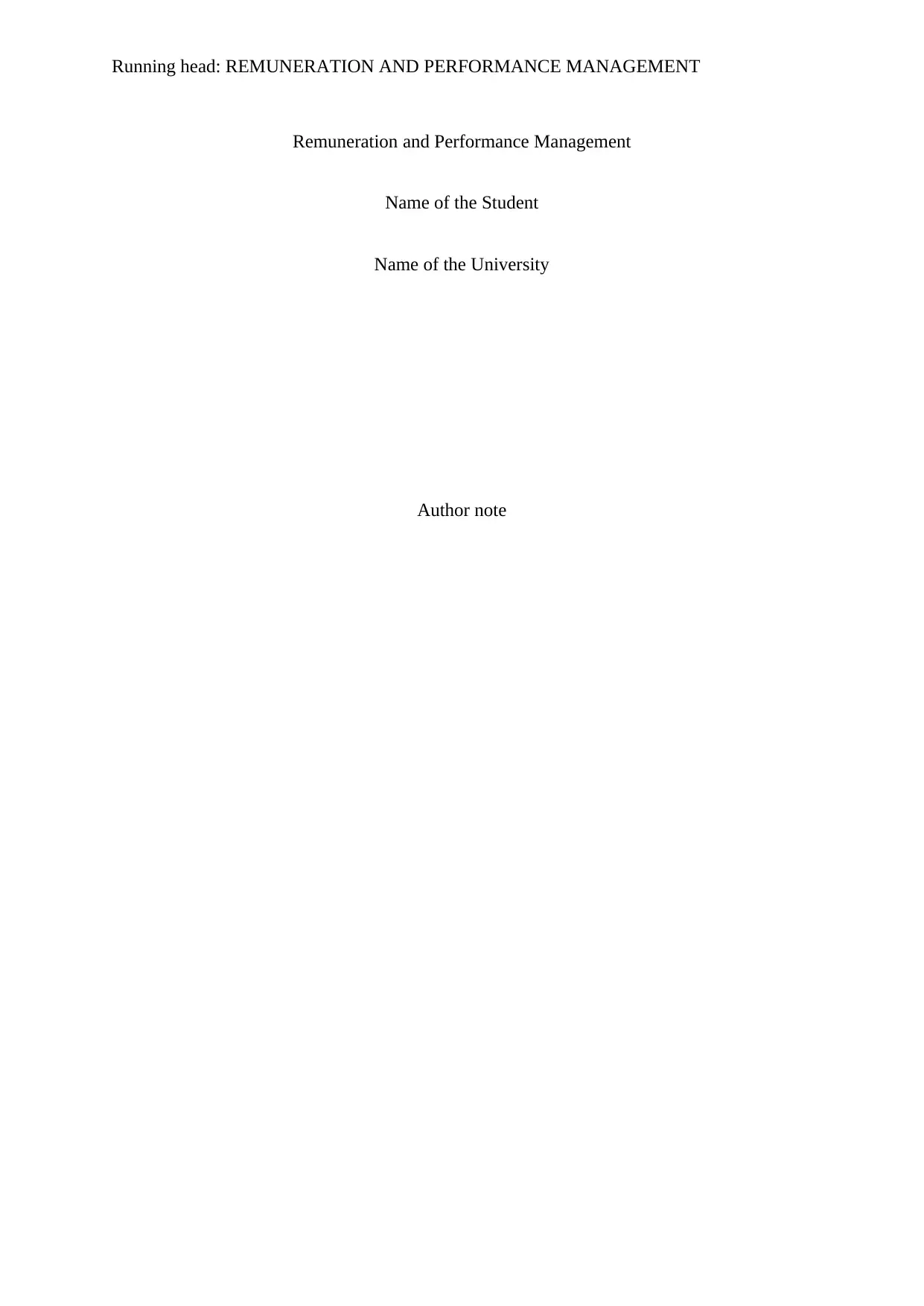
Running head: REMUNERATION AND PERFORMANCE MANAGEMENT
Remuneration and Performance Management
Name of the Student
Name of the University
Author note
Remuneration and Performance Management
Name of the Student
Name of the University
Author note
Paraphrase This Document
Need a fresh take? Get an instant paraphrase of this document with our AI Paraphraser
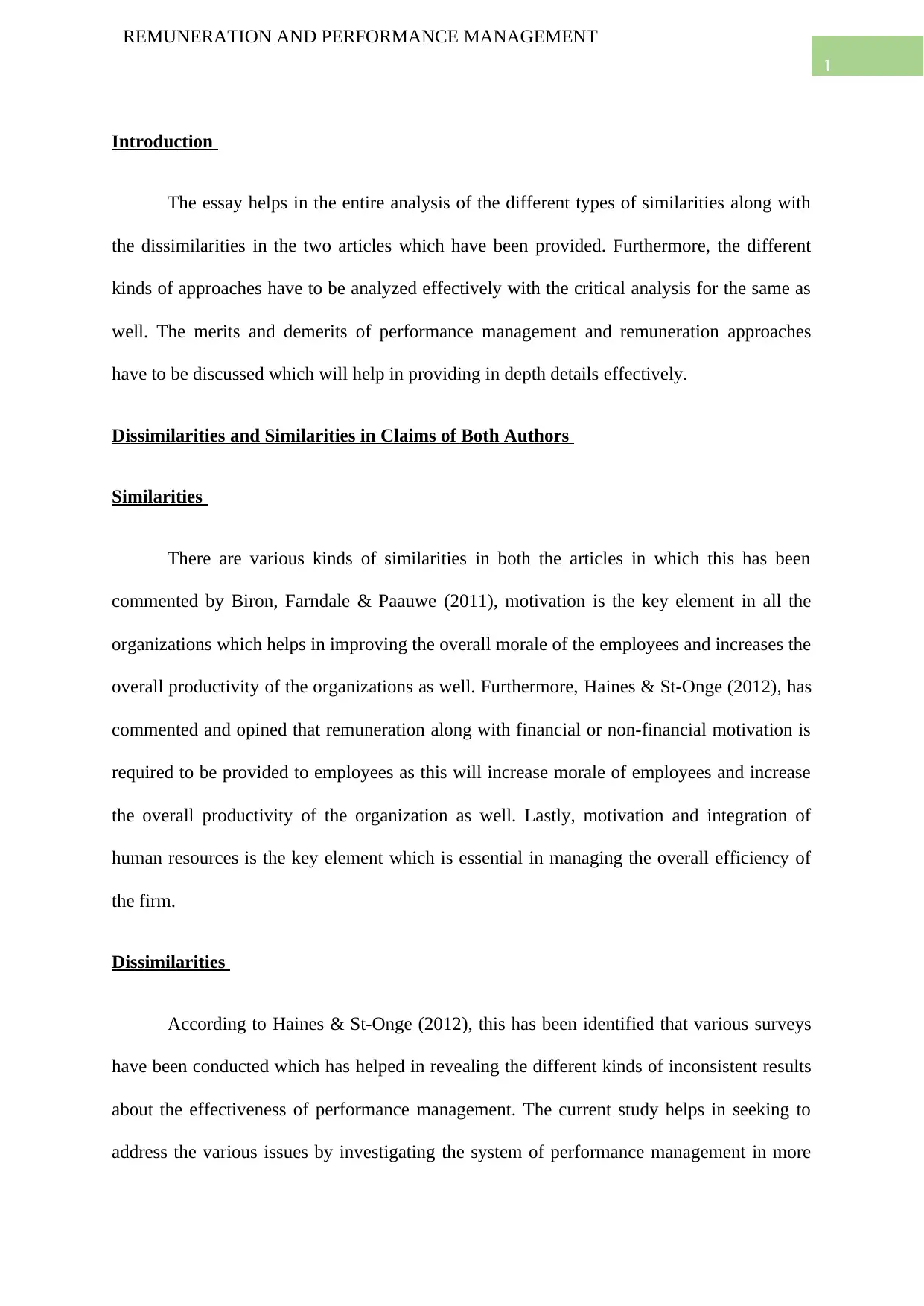
1
REMUNERATION AND PERFORMANCE MANAGEMENT
Introduction
The essay helps in the entire analysis of the different types of similarities along with
the dissimilarities in the two articles which have been provided. Furthermore, the different
kinds of approaches have to be analyzed effectively with the critical analysis for the same as
well. The merits and demerits of performance management and remuneration approaches
have to be discussed which will help in providing in depth details effectively.
Dissimilarities and Similarities in Claims of Both Authors
Similarities
There are various kinds of similarities in both the articles in which this has been
commented by Biron, Farndale & Paauwe (2011), motivation is the key element in all the
organizations which helps in improving the overall morale of the employees and increases the
overall productivity of the organizations as well. Furthermore, Haines & St-Onge (2012), has
commented and opined that remuneration along with financial or non-financial motivation is
required to be provided to employees as this will increase morale of employees and increase
the overall productivity of the organization as well. Lastly, motivation and integration of
human resources is the key element which is essential in managing the overall efficiency of
the firm.
Dissimilarities
According to Haines & St-Onge (2012), this has been identified that various surveys
have been conducted which has helped in revealing the different kinds of inconsistent results
about the effectiveness of performance management. The current study helps in seeking to
address the various issues by investigating the system of performance management in more
REMUNERATION AND PERFORMANCE MANAGEMENT
Introduction
The essay helps in the entire analysis of the different types of similarities along with
the dissimilarities in the two articles which have been provided. Furthermore, the different
kinds of approaches have to be analyzed effectively with the critical analysis for the same as
well. The merits and demerits of performance management and remuneration approaches
have to be discussed which will help in providing in depth details effectively.
Dissimilarities and Similarities in Claims of Both Authors
Similarities
There are various kinds of similarities in both the articles in which this has been
commented by Biron, Farndale & Paauwe (2011), motivation is the key element in all the
organizations which helps in improving the overall morale of the employees and increases the
overall productivity of the organizations as well. Furthermore, Haines & St-Onge (2012), has
commented and opined that remuneration along with financial or non-financial motivation is
required to be provided to employees as this will increase morale of employees and increase
the overall productivity of the organization as well. Lastly, motivation and integration of
human resources is the key element which is essential in managing the overall efficiency of
the firm.
Dissimilarities
According to Haines & St-Onge (2012), this has been identified that various surveys
have been conducted which has helped in revealing the different kinds of inconsistent results
about the effectiveness of performance management. The current study helps in seeking to
address the various issues by investigating the system of performance management in more
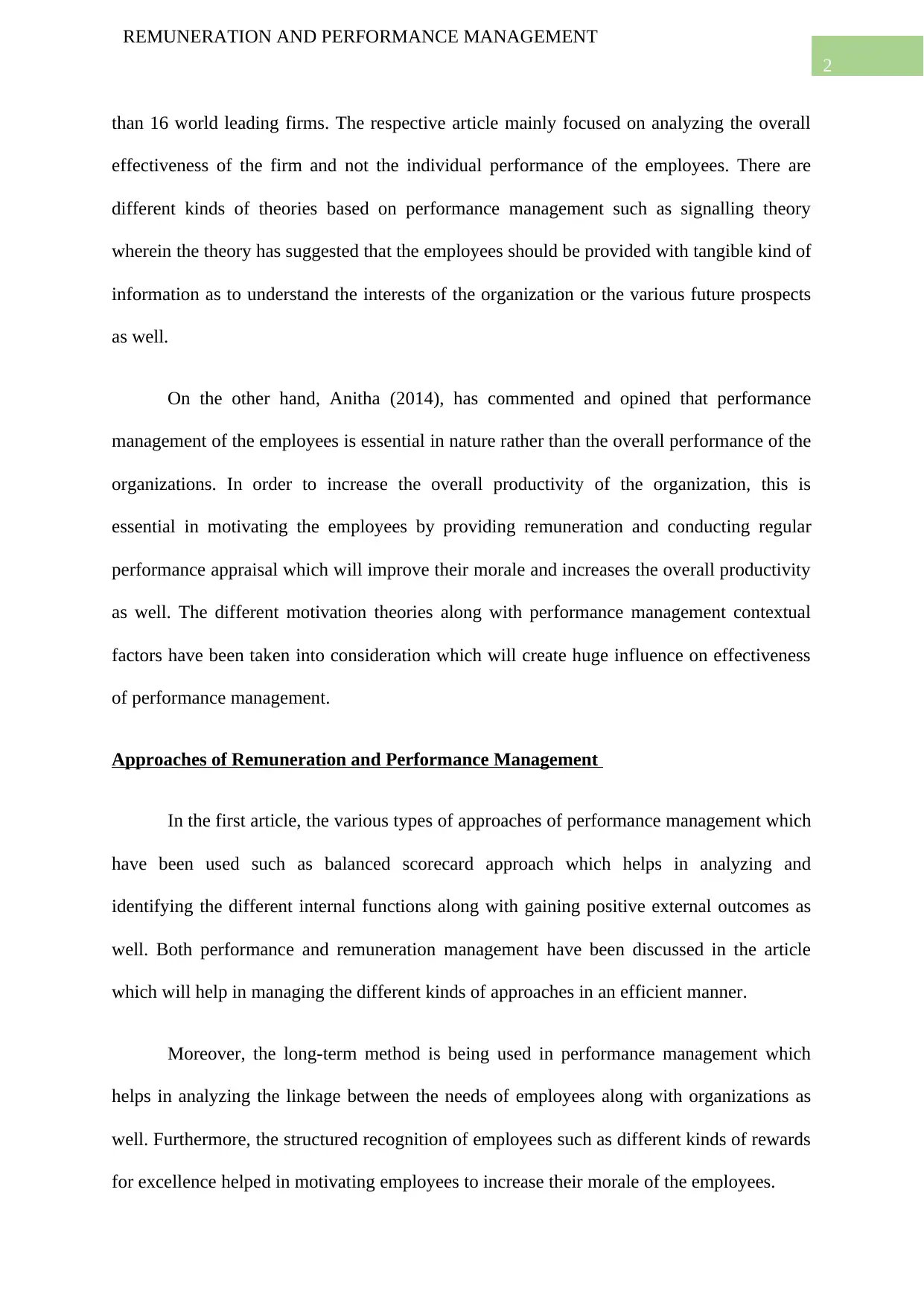
2
REMUNERATION AND PERFORMANCE MANAGEMENT
than 16 world leading firms. The respective article mainly focused on analyzing the overall
effectiveness of the firm and not the individual performance of the employees. There are
different kinds of theories based on performance management such as signalling theory
wherein the theory has suggested that the employees should be provided with tangible kind of
information as to understand the interests of the organization or the various future prospects
as well.
On the other hand, Anitha (2014), has commented and opined that performance
management of the employees is essential in nature rather than the overall performance of the
organizations. In order to increase the overall productivity of the organization, this is
essential in motivating the employees by providing remuneration and conducting regular
performance appraisal which will improve their morale and increases the overall productivity
as well. The different motivation theories along with performance management contextual
factors have been taken into consideration which will create huge influence on effectiveness
of performance management.
Approaches of Remuneration and Performance Management
In the first article, the various types of approaches of performance management which
have been used such as balanced scorecard approach which helps in analyzing and
identifying the different internal functions along with gaining positive external outcomes as
well. Both performance and remuneration management have been discussed in the article
which will help in managing the different kinds of approaches in an efficient manner.
Moreover, the long-term method is being used in performance management which
helps in analyzing the linkage between the needs of employees along with organizations as
well. Furthermore, the structured recognition of employees such as different kinds of rewards
for excellence helped in motivating employees to increase their morale of the employees.
REMUNERATION AND PERFORMANCE MANAGEMENT
than 16 world leading firms. The respective article mainly focused on analyzing the overall
effectiveness of the firm and not the individual performance of the employees. There are
different kinds of theories based on performance management such as signalling theory
wherein the theory has suggested that the employees should be provided with tangible kind of
information as to understand the interests of the organization or the various future prospects
as well.
On the other hand, Anitha (2014), has commented and opined that performance
management of the employees is essential in nature rather than the overall performance of the
organizations. In order to increase the overall productivity of the organization, this is
essential in motivating the employees by providing remuneration and conducting regular
performance appraisal which will improve their morale and increases the overall productivity
as well. The different motivation theories along with performance management contextual
factors have been taken into consideration which will create huge influence on effectiveness
of performance management.
Approaches of Remuneration and Performance Management
In the first article, the various types of approaches of performance management which
have been used such as balanced scorecard approach which helps in analyzing and
identifying the different internal functions along with gaining positive external outcomes as
well. Both performance and remuneration management have been discussed in the article
which will help in managing the different kinds of approaches in an efficient manner.
Moreover, the long-term method is being used in performance management which
helps in analyzing the linkage between the needs of employees along with organizations as
well. Furthermore, the structured recognition of employees such as different kinds of rewards
for excellence helped in motivating employees to increase their morale of the employees.
⊘ This is a preview!⊘
Do you want full access?
Subscribe today to unlock all pages.

Trusted by 1+ million students worldwide
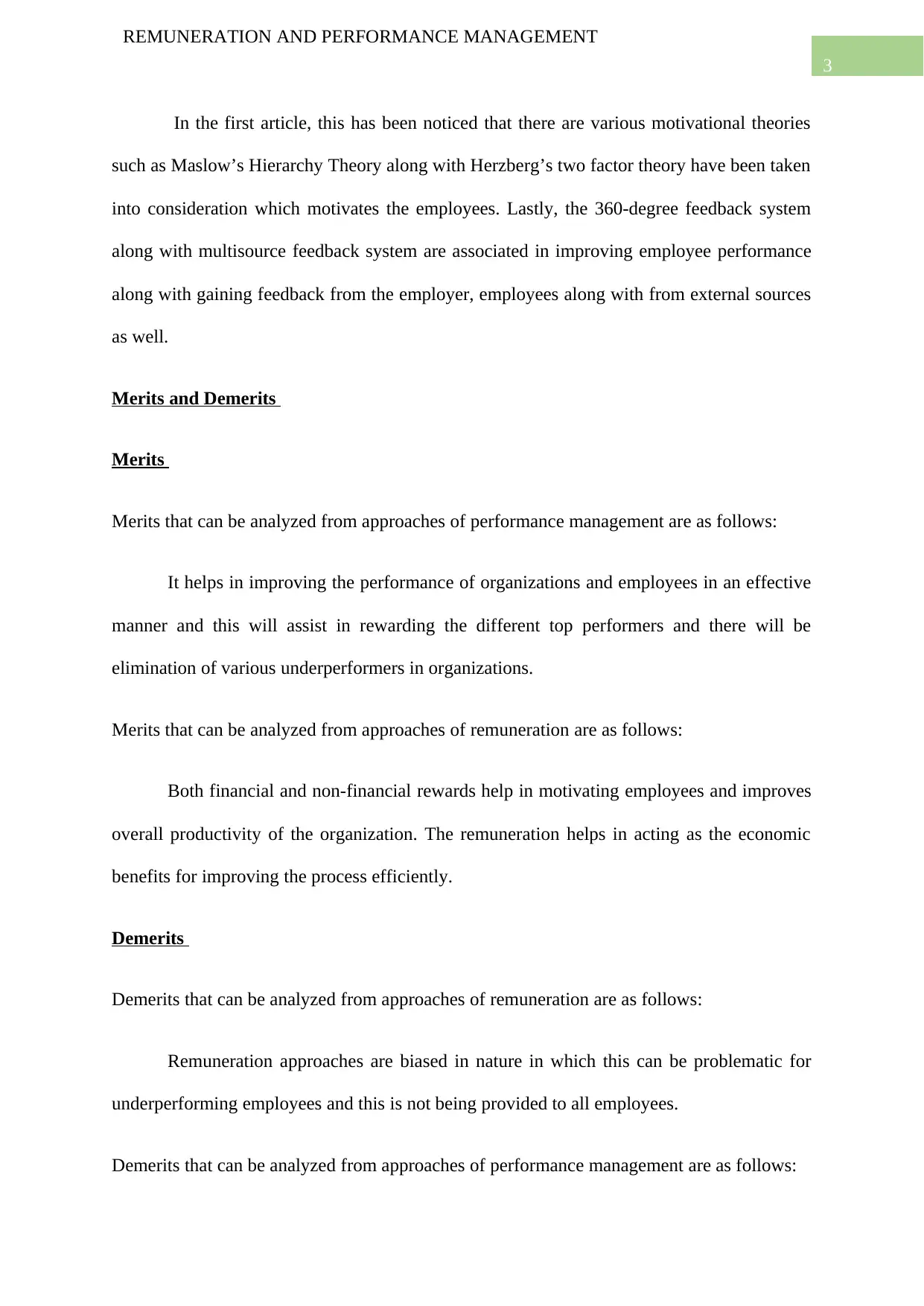
3
REMUNERATION AND PERFORMANCE MANAGEMENT
In the first article, this has been noticed that there are various motivational theories
such as Maslow’s Hierarchy Theory along with Herzberg’s two factor theory have been taken
into consideration which motivates the employees. Lastly, the 360-degree feedback system
along with multisource feedback system are associated in improving employee performance
along with gaining feedback from the employer, employees along with from external sources
as well.
Merits and Demerits
Merits
Merits that can be analyzed from approaches of performance management are as follows:
It helps in improving the performance of organizations and employees in an effective
manner and this will assist in rewarding the different top performers and there will be
elimination of various underperformers in organizations.
Merits that can be analyzed from approaches of remuneration are as follows:
Both financial and non-financial rewards help in motivating employees and improves
overall productivity of the organization. The remuneration helps in acting as the economic
benefits for improving the process efficiently.
Demerits
Demerits that can be analyzed from approaches of remuneration are as follows:
Remuneration approaches are biased in nature in which this can be problematic for
underperforming employees and this is not being provided to all employees.
Demerits that can be analyzed from approaches of performance management are as follows:
REMUNERATION AND PERFORMANCE MANAGEMENT
In the first article, this has been noticed that there are various motivational theories
such as Maslow’s Hierarchy Theory along with Herzberg’s two factor theory have been taken
into consideration which motivates the employees. Lastly, the 360-degree feedback system
along with multisource feedback system are associated in improving employee performance
along with gaining feedback from the employer, employees along with from external sources
as well.
Merits and Demerits
Merits
Merits that can be analyzed from approaches of performance management are as follows:
It helps in improving the performance of organizations and employees in an effective
manner and this will assist in rewarding the different top performers and there will be
elimination of various underperformers in organizations.
Merits that can be analyzed from approaches of remuneration are as follows:
Both financial and non-financial rewards help in motivating employees and improves
overall productivity of the organization. The remuneration helps in acting as the economic
benefits for improving the process efficiently.
Demerits
Demerits that can be analyzed from approaches of remuneration are as follows:
Remuneration approaches are biased in nature in which this can be problematic for
underperforming employees and this is not being provided to all employees.
Demerits that can be analyzed from approaches of performance management are as follows:
Paraphrase This Document
Need a fresh take? Get an instant paraphrase of this document with our AI Paraphraser
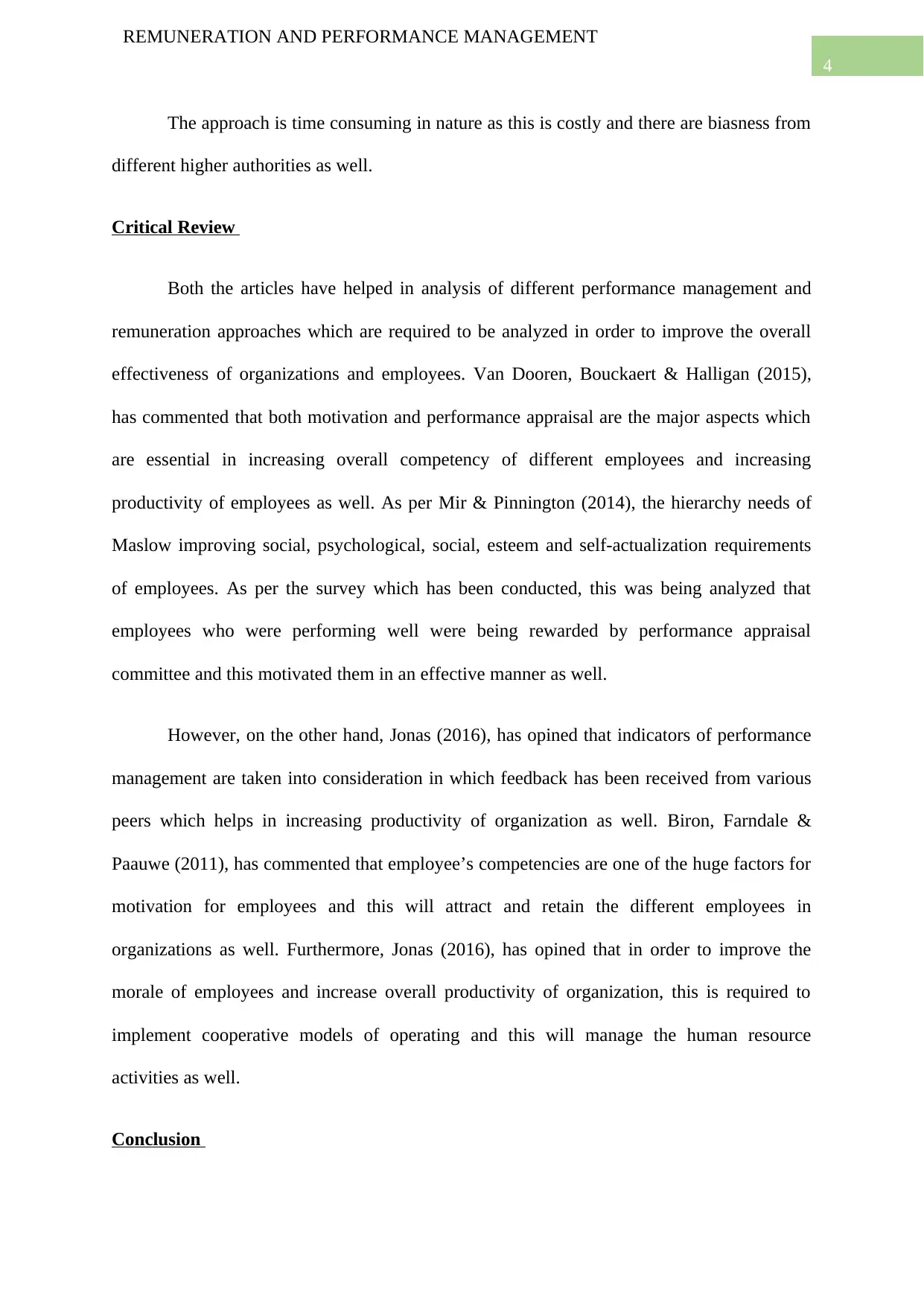
4
REMUNERATION AND PERFORMANCE MANAGEMENT
The approach is time consuming in nature as this is costly and there are biasness from
different higher authorities as well.
Critical Review
Both the articles have helped in analysis of different performance management and
remuneration approaches which are required to be analyzed in order to improve the overall
effectiveness of organizations and employees. Van Dooren, Bouckaert & Halligan (2015),
has commented that both motivation and performance appraisal are the major aspects which
are essential in increasing overall competency of different employees and increasing
productivity of employees as well. As per Mir & Pinnington (2014), the hierarchy needs of
Maslow improving social, psychological, social, esteem and self-actualization requirements
of employees. As per the survey which has been conducted, this was being analyzed that
employees who were performing well were being rewarded by performance appraisal
committee and this motivated them in an effective manner as well.
However, on the other hand, Jonas (2016), has opined that indicators of performance
management are taken into consideration in which feedback has been received from various
peers which helps in increasing productivity of organization as well. Biron, Farndale &
Paauwe (2011), has commented that employee’s competencies are one of the huge factors for
motivation for employees and this will attract and retain the different employees in
organizations as well. Furthermore, Jonas (2016), has opined that in order to improve the
morale of employees and increase overall productivity of organization, this is required to
implement cooperative models of operating and this will manage the human resource
activities as well.
Conclusion
REMUNERATION AND PERFORMANCE MANAGEMENT
The approach is time consuming in nature as this is costly and there are biasness from
different higher authorities as well.
Critical Review
Both the articles have helped in analysis of different performance management and
remuneration approaches which are required to be analyzed in order to improve the overall
effectiveness of organizations and employees. Van Dooren, Bouckaert & Halligan (2015),
has commented that both motivation and performance appraisal are the major aspects which
are essential in increasing overall competency of different employees and increasing
productivity of employees as well. As per Mir & Pinnington (2014), the hierarchy needs of
Maslow improving social, psychological, social, esteem and self-actualization requirements
of employees. As per the survey which has been conducted, this was being analyzed that
employees who were performing well were being rewarded by performance appraisal
committee and this motivated them in an effective manner as well.
However, on the other hand, Jonas (2016), has opined that indicators of performance
management are taken into consideration in which feedback has been received from various
peers which helps in increasing productivity of organization as well. Biron, Farndale &
Paauwe (2011), has commented that employee’s competencies are one of the huge factors for
motivation for employees and this will attract and retain the different employees in
organizations as well. Furthermore, Jonas (2016), has opined that in order to improve the
morale of employees and increase overall productivity of organization, this is required to
implement cooperative models of operating and this will manage the human resource
activities as well.
Conclusion
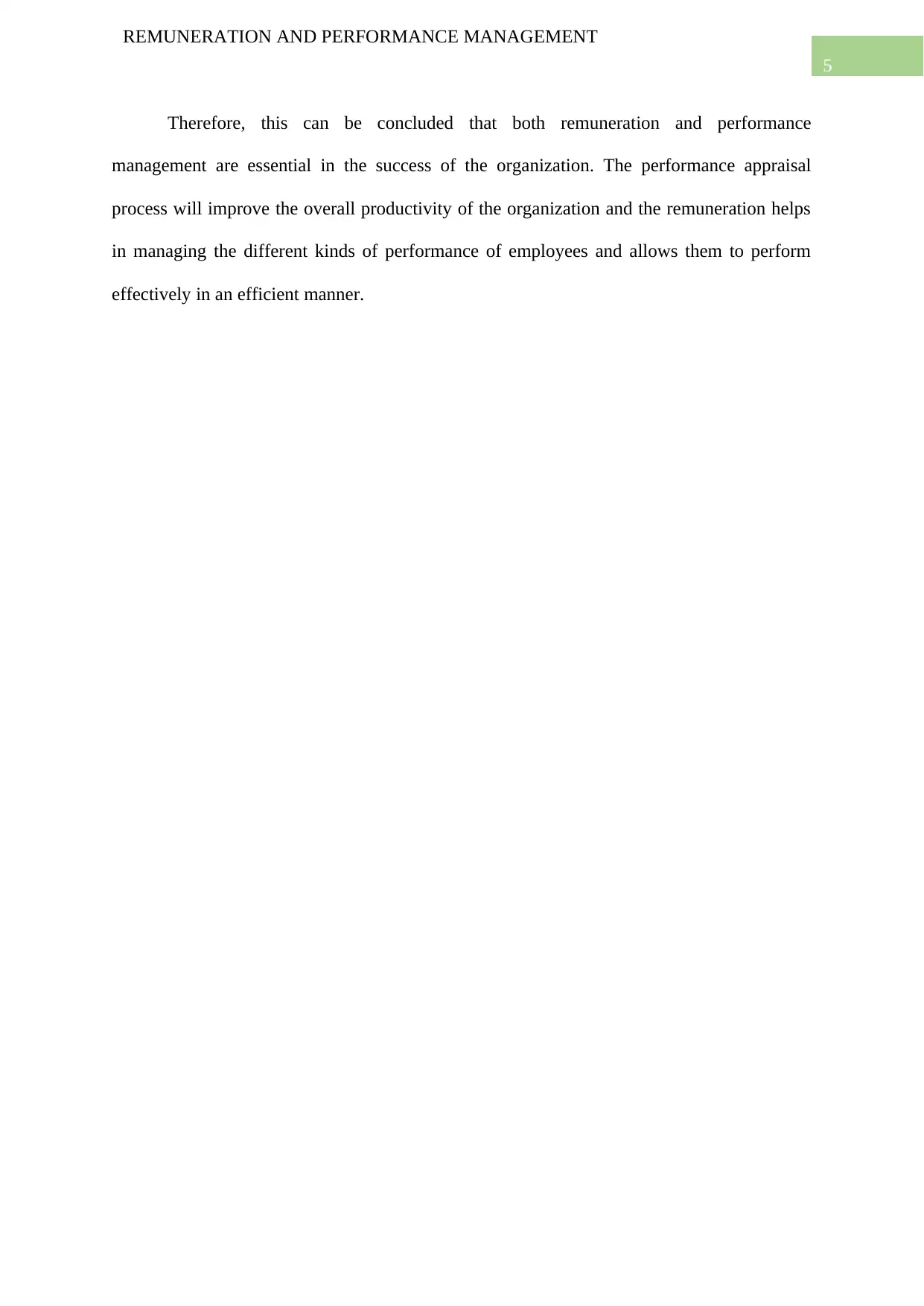
5
REMUNERATION AND PERFORMANCE MANAGEMENT
Therefore, this can be concluded that both remuneration and performance
management are essential in the success of the organization. The performance appraisal
process will improve the overall productivity of the organization and the remuneration helps
in managing the different kinds of performance of employees and allows them to perform
effectively in an efficient manner.
REMUNERATION AND PERFORMANCE MANAGEMENT
Therefore, this can be concluded that both remuneration and performance
management are essential in the success of the organization. The performance appraisal
process will improve the overall productivity of the organization and the remuneration helps
in managing the different kinds of performance of employees and allows them to perform
effectively in an efficient manner.
⊘ This is a preview!⊘
Do you want full access?
Subscribe today to unlock all pages.

Trusted by 1+ million students worldwide
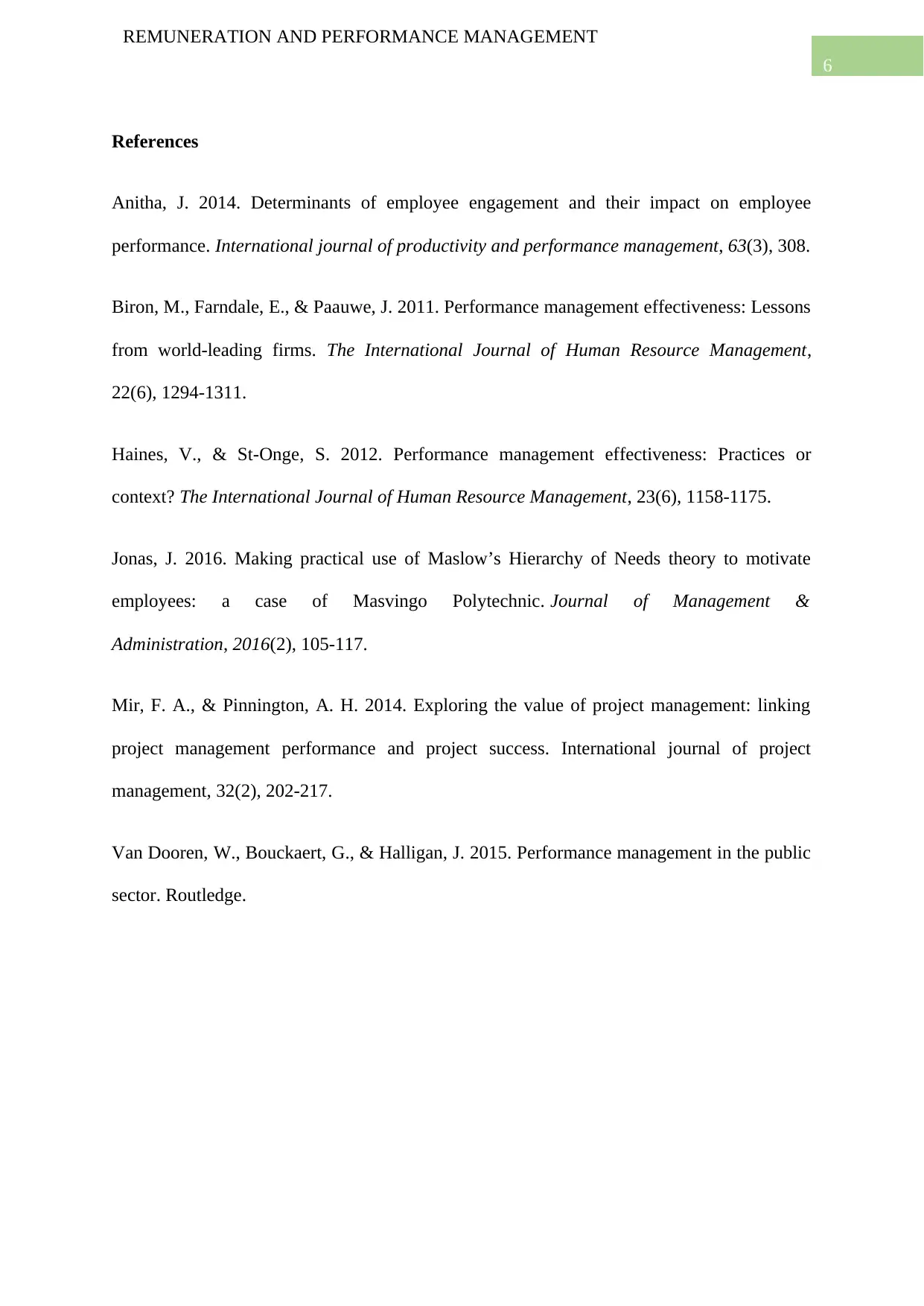
6
REMUNERATION AND PERFORMANCE MANAGEMENT
References
Anitha, J. 2014. Determinants of employee engagement and their impact on employee
performance. International journal of productivity and performance management, 63(3), 308.
Biron, M., Farndale, E., & Paauwe, J. 2011. Performance management effectiveness: Lessons
from world-leading firms. The International Journal of Human Resource Management,
22(6), 1294-1311.
Haines, V., & St-Onge, S. 2012. Performance management effectiveness: Practices or
context? The International Journal of Human Resource Management, 23(6), 1158-1175.
Jonas, J. 2016. Making practical use of Maslow’s Hierarchy of Needs theory to motivate
employees: a case of Masvingo Polytechnic. Journal of Management &
Administration, 2016(2), 105-117.
Mir, F. A., & Pinnington, A. H. 2014. Exploring the value of project management: linking
project management performance and project success. International journal of project
management, 32(2), 202-217.
Van Dooren, W., Bouckaert, G., & Halligan, J. 2015. Performance management in the public
sector. Routledge.
REMUNERATION AND PERFORMANCE MANAGEMENT
References
Anitha, J. 2014. Determinants of employee engagement and their impact on employee
performance. International journal of productivity and performance management, 63(3), 308.
Biron, M., Farndale, E., & Paauwe, J. 2011. Performance management effectiveness: Lessons
from world-leading firms. The International Journal of Human Resource Management,
22(6), 1294-1311.
Haines, V., & St-Onge, S. 2012. Performance management effectiveness: Practices or
context? The International Journal of Human Resource Management, 23(6), 1158-1175.
Jonas, J. 2016. Making practical use of Maslow’s Hierarchy of Needs theory to motivate
employees: a case of Masvingo Polytechnic. Journal of Management &
Administration, 2016(2), 105-117.
Mir, F. A., & Pinnington, A. H. 2014. Exploring the value of project management: linking
project management performance and project success. International journal of project
management, 32(2), 202-217.
Van Dooren, W., Bouckaert, G., & Halligan, J. 2015. Performance management in the public
sector. Routledge.
1 out of 7
Related Documents
Your All-in-One AI-Powered Toolkit for Academic Success.
+13062052269
info@desklib.com
Available 24*7 on WhatsApp / Email
![[object Object]](/_next/static/media/star-bottom.7253800d.svg)
Unlock your academic potential
Copyright © 2020–2026 A2Z Services. All Rights Reserved. Developed and managed by ZUCOL.





